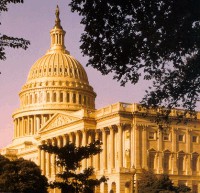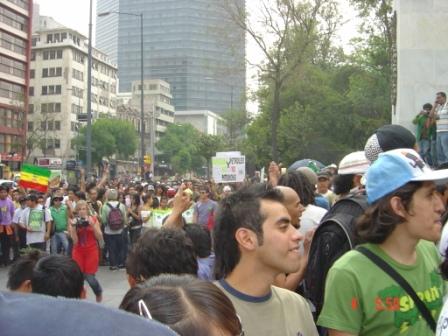With 2008 now rapidly receding in the rear-view mirror, it's time to reflect on the year that was in drug policy. Drug War Chronicle published around 500 separate articles on all aspects of drug policy in 2008 -- national and international, state and local -- and while it's difficult to winnow it all down, below are the stories, processes, and themes we think make up the 10 most important drug reform stories of the year (in no particular order):
Massachusetts Voters Overwhelmingly Pass Marijuana Decriminalization
Marijuana legalization still appears a distant chimera, but three decades after the initial spurt of states decriminalizing marijuana, we may be seeing the beginnings of a new round of successful decriminalization moves. Nevada decriminalized, or defelonized, in 2001, becoming the first state to do so since the 1970s, and in November, Massachusetts approved a decrim initiative with 65% of the popular vote. It goes into effect today, making the Bay State the 12th state to make the possession of small amounts of pot an infraction, not a crime.
New Hampshire could have become the next decrim state last year after a decrim bill surprisingly passed in the House, but it was later killed in the Senate. Suburban Chicago Heights, Illinois, however, adopted decrim in December, and local initiatives making adult marijuana possession offenses the lowest law enforcement priority -- which would result in de facto decrim if law enforcement actually obeyed them -- passed in Hawaii County, Hawaii, and Fayetteville, Arkansas, adding them to a list that now includes Ann Arbor, Denver, Seattle, a half-dozen California communities, and Eureka Springs, Arkansas.

Medical marijuana continues its long march across the states. The biggest victory this year came in Michigan, where voters approved a medical marijuana initiative with 63% of the vote, making Michigan the 13th medical marijuana state and the first in the Midwest. That will undoubtedly help ongoing legislative efforts in states like Kansas, Illinois, Minnesota, and Ohio. In Minnesota, a bill that had passed the Senate in 2007 stalled in the House in the face of veto threats, while in New York, the Assembly passed a medical marijuana bill only to have it see no action in the Senate. Kansas saw its first legislative hearing ever on a medical marijuana bill, although that bill died a few weeks later. Last month, a New Jersey medical marijuana bill won a Senate committee vote and is still alive.
NORA Goes Down to Defeat in California
If marijuana fared well in the November elections, the same thing can't be said for a massive sentencing reform initiative in California. The Non-Violent Offenders Rehabilitation Act (NORA) would have broadened and deepened the Proposition 36 sentencing reforms passed in 2001, but, faced with powerful and deep-pocketed opponents, including drug czar John Walters, the California prison guards' union, and drug court professionals, NORA went down in defeat with only 39% of the vote.
There was more bad news, too: While rejecting NORA, voters approved the Crime Victims Bill of Rights Act, which blocks local authorities from granting early release to prisoners to alleviate overcrowding and mandates that the cash-strapped state -- officials say they will begin issuing IOUs instead of cash payments as soon as March -- fully fund corrections to ensure no prisoners are released early. At least, voters rejected an even more onerous initiative, the Safe Neighborhoods Act, which, while aimed mainly at gang members, violent criminals, and criminal aliens, would also have increased sentences for meth offenses and provided for the expulsion from public housing of anyone convicted of a drug offense. It looks like "tough on crime" still trumps "smart on crime" in the Golden State.
Signs of Life in Congress
After six years of Republican domination of both the executive and legislative branches in Washington, Democrats took back control of the Congress in the November 2006 elections, and by 2008, some small stirrings on drug reform were becoming evident. Not that we expect to see congressional Democrats end the drug war, but every little bit helps.
In February, efforts to finally begin to undo the crack-powder cocaine sentencing disparity got a boost when a House committee held hearings on it. The next month, the Senate passed the Second Chance Act, which had already been passed by the House and which will provide assistance to prisoners reentering society. President Bush signed that bill in April. Even the Republicans seem to have come around a little bit. Several of them supported bills that would address the crack-powder cocaine sentencing disparity, and Republican votes helped get the Second Chance Act over the top.
One bill that Bush would never sign -- it is unclear whether Obama would -- is Rep. Barney Frank's (D-MA) federal marijuana decriminalization bill, the first such bill introduced in decades. Don't hold your breath on this one, but even getting a bill filed in Congress represents progress. In another sign of changing times, in August, Rep. Jose Serrano (D-NY) and 25 cosponsors introduced a bill to end the federal ban on needle exchange funding. A similar bill by Serrano lifted Congress's ban on the District of Columbia government spending its own resources on needle exchange.
Sen. Jim Webb (D-VA) also played an increasingly prominent role in pushing for sentencing and drug policy reform. Using the Joint Economic Committee as his pulpit, he held a 2007 hearing on sentencing and followed that up with a June hearing on the economic and social costs of current drug policies. We sure didn't see anything like that during the years the GOP controlled the Congress.
Not that it's all good on the Hill. Congressional Democrats continued to play the politics of tough on crime and drugs, especially around the issue of funding federal grants to support those multi-jurisdictional anti-drug law enforcement task forces. But from a drug policy perspective, 2008 was a much better year on the Hill than any in this decade. As for 2009, well, that's another article.
Salvia Divinorum and the Prohibitionist Impulse
Efforts to ban the hallucinogenic Mexican plant salvia divinorum picked up pace in 2008, a perfect expression of the reflex prohibitionist response to any new substance. Although the plant has been used by Masatec shamans for centuries, it is new on the recreational drug scene, and that's enough for cops and legislators to want to shut it town, even though the DEA, which has studied it for years, has not moved to do so. Given the scant -- at best -- evidence of any harm done by using it, the only justification for banning it is the idea that somebody somewhere is getting high and must be stopped.
In 2008, California made Salvia sales to minors a misdemeanor (effective yesterday, 1/1/09), while Florida, Illinois, Kansas, Mississippi, and Virginia all banned it or its active ingredient, Salvinorin A. At this writing, a similar bill is on the desk of Ohio Gov. Ted Strickland. Other states where salvia ban efforts were underway in 2008 include Nebraska, South Carolina, Alabama, Massachusetts, and Texas.
The six states that banned it in (or whose previously passed bans went into effect in) 2008 joined Delaware, Louisiana, Maine, Missouri, North Dakota, Oklahoma, and Tennessee, which had all banned it since 2005. 2008 also won the dubious distinction of being the year of the first known arrests in the US for salvia charges. In North Dakota, Kenneth Rau was arrested after ordering $40 worth of salvia leaves on eBay and faced years in prison. It's not known what happened in his case. And in Nebraska, Lincoln shop owner Christian Firoz was arrested for selling salvia even though the plant is not illegal there. He was creatively charged under a law banning the sale of substances for the purpose of intoxication. His trial is pending.

Britain had taken a bold step forward when, heeding the recommendations of numerous advisory panels, it downgraded marijuana from a Class B to a Class C drug in 2004. But in May, desperate to burnish its tough on drugs and crime credentials, a flailing Labor government announced it was returning marijuana to Class B. Labor was aided and abetted in turning public opinion against marijuana by a Reefer Madness-style tabloid campaign that would have made William Randolph Hearst blush. For weeks on end, credulous tabloid readers were treated to headlines along the lines of "Son twisted by skunk knifed father 23 times," "How cannabis made me a monster," "Escaped prisoner killed man while high on skunk cannabis," "Boys on skunk butchered a grandmother," and "Teen who butchered two friends was addicted to skunk cannabis" -- and that's just from one newspaper, the Daily Mail.
Since then, the Reefer Madness campaign has subsided somewhat, only to be replaced by a steady diet of "cannabis factory" bust stories, with grow ops being busted on a daily basis and their operators too often hustled off to gaol. The steady drumbeat of sensational press stories may help explain declining support for drug reform in recent polls. In any case, marijuana goes back to being a more serious offense at the end of this month, and Britain marches resolutely backward into the last century.
America Wages Ineffective War Against Poppies and Islamists in Afghanistan
2008 was the bloodiest year yet for American and NATO forces in Afghanistan, where 155 American troops and 138 NATO troops were killed, along with uncounted thousands of Afghan rebels and civilians. While the country saw a slight reduction in opium cultivation and production, Afghanistan still produces more than 90% of the global opium supply, and that fact leaves the West with a terrible paradox: Try to eliminate the drug trade and face driving Afghan peasants into the waiting arms of the Taliban, or ignore the drug trade and let the Taliban profit to the tune of $100 million a year or more. That buys a lot of shiny new weapons to shoot at foreign troops and their Afghan government allies.
NATO and the US military want nothing to do with pissing off poppy-planting peasants, much to the dismay of the State Department and the drug warriors, but in October reluctantly agreed to enlist in the war on poppies by targeting drug traffickers associated with the Taliban -- but not those associated with the government in Kabul. Afghanistan is possibly the most serious foreign policy crisis facing the United States, the situation is deteriorating, and the drug war and drug prohibition were right in the middle of it.
America Gets High, Mexico Bleeds
Mexican President Felipe Calderón took office in December 2006 and immediately sent in the army to battle that country's so-called cartels. It hasn't gone well: Since then, more than 7,000 people have been killed in prohibition-related violence, with 2008's toll alone climbing above 5,000 as the multi-sided violence escalated. The Chronicle was there -- in person -- reporting on the military takeover of Reynosa in February, covering a conference on alternatives to the drug war in Sinaloa Cartel hometown Culiacán in May, and reporting on efforts to address military impunity for drug war human rights violations on that same trip.
Since then, matters have only deteriorated, with little sign of any improvement on the horizon. And the US is determined to make matters worse, with the Bush administration and the Congress approving a three-year, $1.4 billion "Plan Mérida" aid package to provide anti-drug assistance to the Mexican police and military. But with drug corruption scandals in law enforcement there occurring on an almost weekly basis, it is difficult to see how even a massive aid package is going to make much difference.

Mexico is living with the bloody results of drug prohibition that makes the violence of American cities pale by comparison. And that is provoking, finally, some outside the box thinking.
The Endless War Against Coca and Cocaine
There was little for American policymakers to applaud when it came to the Andean drug war last year. Nine years and $5 billion after Plan Colombia commenced, Andean coca production is essentially unchanged, and the GAO reported that it had not succeeded on its own terms. Still, Washington remains committed to Colombian President Ãlvaro Uribe, one of its few friends remaining in the region, despite the ineffectiveness of eradication and interdiction and despite continuing human rights violations as denounced by Amnesty International in a November report.
Meanwhile, Bolivian President Evo Morales joined Washington bête noire Hugo Chávez of Venezuela in throwing out the DEA (Chavez did it in 2005, Morales in October), as relations between the Bolivarian allies and the US grew extremely chilly, especially after President Bush listed them as the only countries in the hemisphere to be decertified as not cooperating in US drug policy goals. Only part of the problems were directly related to drug issues, but Morales and Chávez proved adept at parlaying regional angst over America's drug war into a broader offensive against the colossus of the north. Now, Bolivia will go it alone on drug policy, leaving US desires behind.
In Peru, meanwhile, President Alan GarcÃa's mid-year deployment of the military to coca growing zones in a twin bid to eradicate crops and weaken a resurgent Shining Path produced little more than unhappy results. Pressure on coca growers in the southern valleys produced coca grower incursions on indigenous lands, while the fight against the Shining Path produced only the highest military and police death toll since the bloody insurgency was defeated in the early 1990s. Now, largely stripped of its Maoist ideology, but equipped with shiny new weapons bought with the profits of prohibition, the Shining Path is reemerging.
The Prohibitionist Consensus Erodes in Latin America
2008 saw significant movement toward alternatives to prohibition and the drug war in Latin America, some of the most important ones coming from the courts. In April, an Argentine court threw out drug possession charges against two young men on the grounds they were unconstitutional, and five weeks later, a Brazilian appeals court ruled the same way. One week after that, another group of Argentine jurists threw out marijuana possession charges against a young man, saying criminalizing drug possession without demonstrating harm to others was unconstitutional. By July, Argentine President Cristina Fernández de Kirchner was calling for decriminalization of drug possession.
Meanwhile, in London in May, Colombian Vice-President Francisco Santos called for debating cocaine legalization, and at the end of July, Ecuadorian President Rafeal Correa pardoned hundreds of low-level drug mules, saying it was absurd to imprison them. In October, Honduran President Manuel Zelaya joined the growing chorus, saying that drug possession should be decriminalized and hinting at larger legalization.
And, as noted above, there are the legalization noises now coming from Mexico, as well as the disdain for US prohibitionist policies from Bolivia and Venezuela. While Washington has been distracted, it looks like a sea change is getting under way down south.
This work by StoptheDrugWar.org is licensed under Creative Commons Attribution-ShareAlike 4.0 International
Comments
Reefer psychosis in the UK
Reefer psychosis in the UK has been a nightmare, personally having attended the ACMD meeting in a public capacity.
I was appalled the government refused the advice of there own selected group of experts, and went for fiction.
We have noticed this in the UK.
What has been happening in the States and other parts of world have kept the Anslinger misinformation at bay.
This shows you how reefer madness spreads , we have also have a first recorded death by overdose in Wales, which shows you that our Press, just make it up as they go along.( yellow journalism I wonder?)
Great Article, and may we all globally legalize cannabis.
Winston Matthews ( Legalise Cannabis Alliance UK)
CIA SMUGGLING
I BELIEVE THAT PRESIDENT O'BAMA SHOULD ASSEMBLE AN UNDERCOVER OPERATION INTO THE CIA AND INTERNATIONAL BANKERS BLACK OPS, USING AIRCRAFT TO STOCK EVERY MAJOR CITY IN THE UNION WITH COCAINE FROM LATIN AMERICA AND HEROIN FROM AFGHANISTAN.
Don't lock up drug dealers who make less than $40 Million!
NO, they should be commended and let out behind the court house and shot against a post. The public should be permitted to watch the killing and agony of the dying person. Then, after some fifty of so executions my bet is the selling of drugs would be rare as frogs hair.
Add new comment